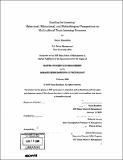Leading for learning : behavioral, educational, and methodological perspectives on multicultural team learning processes
Author(s)
Kanehira, Naoto, S.M. Massachusetts Institute of Technology
DownloadFull printable version (28.35Mb)
Alternative title
Behavioral, educational, and methodological perspectives on multicultural team learning processes
Other Contributors
Sloan School of Management.
Advisor
Deborah Ancona.
Terms of use
Metadata
Show full item recordAbstract
This study starts from the notion that leadership is about mobilizing learning, and simultaneously pursues multifaceted purposes that benefit from each other: 1) to shed new light on learning behaviors of teams facing unfamiliarity, 2) develop one model of practical and effective leadership education, and 3) apply new technology to make methodological contributions to organizational studies, leadership education, and management practices. 1) The central research question is what behavioral factors affect team learning when the team faces both internal and external unfamiliarity - which stems from diversity and cultural barriers, and disruptive threats from the environment. The study examines 6 multicultural teams undergoing increasingly complex tasks, revealing the structures and processes with which they self-organized and temporal responses to the difficulties. 2) The experimental setting was a 10-days intensive leadership workshop with a distinct educational purpose to raise the participants' levels of contextual, reflective, and moral awareness, with the premise that exercising leadership involves mobilizing learning to adapt to unfamiliarity. The study attempts to assess the effectiveness of the workshop, while examining the effects of exercise of leadership on the teams' learning processes. 3) The study also applies wearable sensors that capture nonlinguistic social signals and visualize group interaction patterns, for 3 intended applications as (a) research tool for social network analysis to supplement ethnography, (b) learning tool to stimulate reflection and dialogue, and (c) intervention tool to alter the flows of information. (cont.) The study identified 3 team learning strategies: inoculation (face internal difficulties earlier and get prepared for an external threat), time out (stop actions when facing a threat and use it to re-orient team's attention to internal difficulties), and structure it away (develop an internal structure that eliminates the internal difficulties). The conditions for team learning and personal development, appropriate challenge and support, resulted from exercise of leadership that emerged from complex interactions among the team members and the facilitators. Commonly observed signs of such conditions included surfacing and facing conflicts, revealing vulnerabilities, accommodating emotional breakdowns, and sense of mutual respect based on demonstrated acceptance. The study indicates that use of sensors contributed to formation of the team learning condition.
Description
Thesis (S.M.)--Massachusetts Institute of Technology, Sloan School of Management, 2008. Includes bibliographical references (p. 171-192).
Date issued
2008Department
Sloan School of ManagementPublisher
Massachusetts Institute of Technology
Keywords
Sloan School of Management.